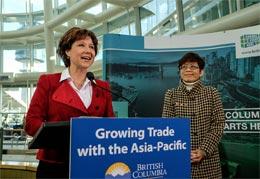SME’s are the secrets for success in Asia

Guest Commentary
By Eva Busza
When it comes to Asia the adage is true: Canada can be considered a trading nation, but not a nation of traders.
Less than one per cent of small and medium-sized businesses in Canada export to Asia. Some argue that by their very nature, small and medium-sized businesses (SMEs) are too small to penetrate Asia's many large and diverse markets. However, as Canadian SMEs make up the backbone of our economy, their success in taking advantage of market opportunities in Asia is imperative for Canada's future economic prosperity.
The Bank of Canada's April 2015 Monetary Policy Report states that Canada's future GDP growth prospects will be heavily linked to exports. This means that both government and the private sector in Canada have a vested interest in seeing SMEs succeed in Asia. Alas, all too often Canada's private sector sits on the sidelines hoping that SMEs will navigate their own way to Asia.
A few large firms in Canada, however, are starting to recognize the positive effects of SMEs' success in Asia. Two notable examples of companies moving in this new direction are Aéro Montréal in Quebec and China-based CNOOC, the parent company of Calgary-based oil company Nexen.
Recently, CNOOC led a group of Alberta-based SMEs on a China trade mission to facilitate business partnerships between Canadian SMEs and Chinese energy companies. It is this type of mentoring relationship between SMEs and multinational corporations that will be a key contributor to Canadian SME success in Asia.
Certainly CNOOC's SME trade mission to China has strengthened the quality of its SME network in Alberta and helped CNOOC Group subsidiary companies generate business connections and acquire knowledge of Canadian expertise, technology, and services. But it has also demonstrated a positive outcome of Chinese investment in Canada and showcased Canadian companies as world-class energy service providers.
As for the Albertan SMEs, they benefit from a unique opportunity to promote their businesses under the umbrella of China's third-largest national oil company.
In Quebec, multinational corporation Aéro Montréal is also championing the cause of SMEs. Through its 'Mach Initiative,' Aéro Montréal is strengthening Quebec's aerospace supply chains by facilitating collaborations between aerospace SME suppliers and larger company customers, such as Bombardier and Air Canada.
In providing this mentorship, Aéro Montréal seeks to strengthen its own supply chains to meet the future demand for aircraft, a future demand it sees being driven extensively by Asia.
The SMEs, meanwhile, benefit by being mentored by world-class aerospace firms and receiving tailored training programs to boost their domestic and international competitiveness.
The Canadian government, for its part, announced in its 2014 Global Market Action Plan, an ambitious target of increasing the current number of Canadian SMEs exporting goods and services abroad from 11,000 to 21,000. Within this plan, Asian markets have received a priority designation and as such will receive increased government personnel and funds over the next five years.
Although the government is playing an important role in helping Canadian SMEs enter Asia by pursuing trade and investment agreements with Asian partners, providing financial assistance to Canadian SMEs, and expanding Canada's trade commissioner services in key emerging economies, the assistance required for many Canadian small businesses to reach full export potential in Asia cannot be achieved by government support alone.
Exporters need to establish quality business connections in Asia in order to thrive there in the long run. The reputational guarantee and potential business connections that large international companies such as CNOOC can offer are unparalleled in the public sector. Companies like CNOOC open the doors of key Chinese executives for SMEs.
Which is why Canada needs its largest corporations with experience doing business in Asia to step up to the plate. By acting as mentors, larger multinationals can become small business champions, helping SMEs surmount the barriers of doing business abroad and bridging their gap in international business acumen. This has obvious benefits for the SMEs, but also has direct positive effects for larger corporations.
As we look to improve the percentage of Canadian SMEs exporting to Asia, we cannot neglect the role of the private sector in building business relations. As our SMEs' presence in Asian markets improves, this will truly build the profile of Canadian goods and services abroad. With the focus of the global economy shifting to Asia, one percent is not going to cut it.
Eva Busza is Vice-President, Research and Programs at the Asia Pacific Foundation of Canada.









